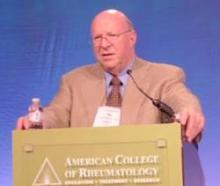SAN FRANCISCO – Sarilumab, an investigational monoclonal antibody directed against the IL-6 receptor, demonstrated efficacy at two different dose levels, compared with placebo, in patients with active rheumatoid arthritis (RA) who were intolerant to or had inadequate response to anti–tumor necrosis factor (anti-TNF) inhibitors in the pivotal phase III TARGET study.
On all measures of disease activity and physical function, sarilumab was significantly superior to placebo in these very sick patients. Results were presented at the annual meeting of the American College of Rheumatology.
“New treatments are needed to address unmet patient needs, including the failure to respond to therapy. Sarilumab, if approved, may be a potential option for RA patients with moderate to severe RA,” said Dr. Roy Fleischmann of University of Texas in Dallas.
“Both the 150-mg and 200-mg doses of sarilumab demonstrate improvement and clinical efficacy versus placebo in these patients. The higher dose appears to have slightly better efficacy but also had a higher incidence of treatment-emergent adverse events leading to discontinuations. The 150-mg dose may be a little safer. I would start with 200 mg and methotrexate and if an adverse event occurred, lower the dose to 150 mg,” Dr. Fleischmann told the audience.
TARGET enrolled 546 patients with active RA for at least 6 months who were intolerant to or failed prior anti-TNF therapy. Active disease was defined as at least six swollen and eight tender joints. All patients had high C-reactive protein (CRP) levels at screening (more than 8 mg/L).
The patients’ median age was 52 years, and 80% were female. Median duration of RA was 12 years. Twenty-five percent had been treated with more than one prior anti-TNF agent. About 74% were rheumatoid factor positive.
“These were recalcitrant and sick RA patients,” Dr. Fleischmann said.
Patients were randomized to sarilumab 150 mg, 200 mg, or placebo in addition to background conventional DMARD therapy. Study drugs and placebo were self-administered subcutaneously every other week. Patients who did not respond adequately to therapy at week 12 were rescued with sarilumab 200 mg every 2 weeks.
“Both doses of sarilumab had significantly improved ACR 20/50/70 response, compared with placebo,” he said.
Mean change from baseline to week 12 in Health Assessment Questionnaire–Disease Index (HAQ-DI), which assesses daily physical function, was –0.49, –0.50, and –0.29 in the 200-mg, 150-mg, and placebo groups, respectively (P = .0004 and P = .0007, respectively, for each dose of sarilumab).
The percentage of patients with an ACR 20 response at week 24 was 61%, 56%, and 34%, for the 200-mg, 150-mg, and placebo groups, respectively (P less than .0001, for both comparisons).
Sarilumab was also superior to placebo for all secondary endpoints, including the percentage of patients achieving an ACR 50 and ACR 70 response, change from baseline in Disease Activity Score (DAS) 28-CRP, achieving DAS28-CRP less than 2.6, change from baseline in clinical disease activity index (CDAI), and change in HAQ-DI at week 24.
Looking at safety, treatment-emergent adverse events were more frequent in the sarilumab-treated patients, compared with placebo: 65% for the 200-mg dose, 66% for the 150-mg dose, versus 50% for placebo. Serious adverse events were more frequent in the sarilumab 200-mg group, compared with placebo (5% versus 3%), and were similar to placebo in the sarilumab 150-mg group (3%)
Serious infections occurred in two patients in the sarilumab 200-mg group, one patient in the sarilumab 150-mg group, and two patients on placebo. Neutropenia and infection were the most frequent adverse events leading to treatment discontinuations (17 in the 200-mg group, 14 in the 150-mg group).
Regeneron Pharmaceuticals and Sanofi funded the study. Dr. Fleischmann disclosed financial ties with Abbvie, Akros, Amgen, Ardea, AstraZeneca, Bristol-Myers Squibb, Celgene, GlaxoSmithKline, Janssen Pharmaceutica Products, Eli Lilly & Co., Merck Pharmaceuticals, Pfizer, Resolve, Roche Pharmaceuticals, Sanofi-Aventis Pharmaceuticals, and UCB.


